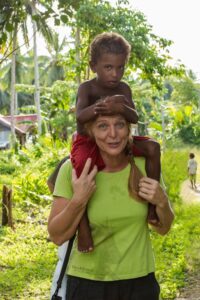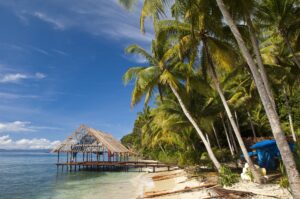Swiss Success Stories – Episode I: Maya Hadorn
A long, long time ago, there was a remote island called Pulau Pef, a small piece of land ruled by a benign Raja (king). Under his rule, the island dwellers enjoyed an untroubled life in peace and harmony. One peculiar morn-ing, however, he was ripped from his slumber by an eerie whisper: he overheard the neighboring isle’s people planning to overthrow him! Utterly enraged, the king punched the face of a cliff with such force that Pulau Pef split into countless tiny pieces, creating the rugged isle we know today. On thatmorning, the Raja swore to watch over his beloved island for all eternity.
Maybe it was precisely the Raja’s spirit that lured Maya Hadorn to this secluded island; or maybe it was just pure coincidence. At any rate, when Maya first set her eyes on Pulau Pef, it was love at first sight. And who could blame her? The island paradise is jam-packed with spectacular creeks, deep-blue lagoons, white sandy beaches and picturesque coral reefs. Maya realized straight away: here, she could create something truly meaningful. And that’s exactly what she did. But who is this woman? Why did she choose this location to settle down? What's the secret of her success?
A New Home
Born in 1967 as the youngest of five siblings of a humble farming family, Maya Hadorn spent her early years in Kölliken (AG), after which her family moved to Pfaffnau (LU). While she spent her childhood in her native region and trained to be a chef in Valais, Maya always knew: one day, she would set out to explore the great, wide world.
Indeed, in her early twenties that day had finally come. Maya journeyed across the globe and eventually ended up on the Maldives, where she started her first job overseas. In 2006, she went to Indonesia, where a friend found her a job as the manager of a resort in Raja Ampat, a remote archipelago in Indonesia’s far east. “My first reaction? ‘Thanks, but no thanks!’ Why should I give up my good life in Switzerland for some job in the middle of nowhere?”, Maya remembers.
But still. The islands’ sweet callingwas hard to ignore, and Maya has always had an adventurer’s heart. Ultimate-ly, it proved just too tempting and she ended up accepting the job offer — but only for one or two years, she told herself.
Three years later, she finally decided to indeed return to Switzerland. Her employees begged her to stay or perhaps to even build up something of her own on Raja Ampat. But Maya couldn’t imagine doing anything of the sort. She may have been an adventurer, but not a dreamer. She knew that you could hardly organize such a project on your own, let alone in a country like Indonesia. She was adamant about going back to Switzerland. After all, that was her plan all along.
“The island found me, not the other way round.”
But shortly before she hopped on the plane, destiny struck again. During a team excursion, she saw Palau Pef for the first time in her life, and it was love at first sight. Enthralled by the island’s diverse and untamed nature, Maya knew right away that she wanted to create something special at this heavenly spot. That “something special” turned out to be the Raja4Divers, a unique diving resort that boasts the highest ratings on Tripadvisor.
Between Tropical Storms and Hauntings, or: How to Build a Dream Resort from Scratch
Building the resort turned out to be both an adventure and a challenge for Maya and her team. On the one hand, there was the climate: during the construction period, work was frequently disturbed by heavy rainfall. At that time, the island had no infrastructure to speak of, so that Maya and her team had to spend their nights in rickety tarp tents, which sometimes nearly got carried away by the wind. The situation was made worse by ill-ness, isolation and merciless muggy heat.
Procuring the necessary materials proved to be a problem as well. Sometimes suppliers failed to deliver be-cause the villages were currently haunted by heart-devouring ghosts, meaning that the workmen had to stay at home to protect their families. Furthermore, Maya would also have to quickly learn that the word “quality” had a totally different meaning in Indonesia.
Such differences of opinion always require a great deal of tact: “You cannot be overly direct. Rather, you need to explain the issue at hand in a roundabout way.” Not always easy for somebody with Maya’s hot-tempered nature. “But I was thinking of my guests. They expect quality for their money, especially after the long trip to the island. That’s why I always have to build bridges. What matters in the end is that the guests are happy, while my employees and business partners aren't completely overwhelmed.”
In the meantime, Maya has found a workable middle ground. Today, ten authentic Papuan bungalows dot a palm-lined beach on this island paradise. From here, you can comfortably explore the colorful and diverse un-derwater world of Raja Ampat’s coral reefs. Alternatively, island’s diversity invites guests to go on a hike, do some kayaking, snorkel, climb, or to simply enjoy the sun.
“On my business trips, I’m often asked how many stars my hotel has. My reply: ‘Thousands: you simply have to go outside at night and look up at the sky.’”
While there is no shortage of luxury — the spacious bungalows offer anything your heart could desire, from a hammock to an iPad — you’ll be hard-pressed to find unnecessary knick-knack. “Our aim is to offer a highly authentic experience in an informal setting. The island’s nature and people are the real luxury here.’
This mix seems to be Maya’s recipe for success, as her guests appreciate being so close to the Indonesian staff. “In many resorts, cooks, waiters and domestic workers have to stay in the background. We do not create such gaps. They, too, are allowed to eat at the restaurant and mingle with the guests.’ The latter use this opportunity for example to learn to cook exotic dishes with the Indonesians. “Real friendships are born out of such encoun-ters, and sometimes people even shed a tear when the time to part arrives. This is what makes this resort so special.”
Dolce Far Niente in Paradise? Nothing of the Sort! Hard Work & Pragmatism Breed Suc-cess
But not even living in the tropics means you get to laze around all day long. As ought to be general knowledge, anyone wanting to be successful needs to put in lots of hard work. “Don’t think that our life is just peace, love and harmony with us just lying on the beach. We work hard around the clock to make sure our guests are happy and to keep our resort going. In fact, for some Western employees the conditions have turned out to be too demanding. The seclusion and the island’s harsh environment—e.g. the lack of privacy —may quickly bring you back down to earth.”
In spite of her love for the island, Maya never permitted herself to get dazzled. Talking to her, you quickly real-ize that her unwavering passion blends with a healthy dose of pragmatism. This combination seems to have served her well at the time of her great leap abroad: “Don’t be naive and think that you can do everything on your own. Having local contacts is imperative. You need competent people whom you can trust, who have the necessary drive, and who know how to deal with local authorities.”
“Pulau Pef is beautiful. But I do not want to grow old here.”
Her pragmatism is also demonstrated by her being a Soliswiss member for over ten years. “I wanted to enjoy good overall protection while in Indonesia, too. If something were to happen to me, I wouldn't want to see the rug pulled from under my feetall of a sudden . I appreciate Soliswiss as a partner who knows what is important for Swiss aborad. I have always received personal, friendly and competent advice, e.g. regarding my return to Switzerland. Soliswiss makes sure I receive the advice and safety I need.”
Maya already knows: she will not stay on Pulau Pef forever: “Of course, I like it very much here, and Pulau Pef has become a sort of second home for me. But here I am and will always be “Ibu Maya”, the boss, the foreigner. In Switzerland, on the other hand, I can be just Maya, and be surrounded by family and friends – that is ex-tremely important for me.”
“Emigrating should not be an escape, because you’ll just take your problems with you.”
To those thinking of emigrating, Maya has a piece of advice: “If your reason for leaving your country is to run away from your troubles, then forget about it. Your problems are guaranteed to catch up with you sooner or later.” Many expats draw a distorted image of their dream destination. “That’s why it’s best to work in the new country for a while in order to see what life there is like – don’t just rush into it. But if you emigrate for the right reasons and proceed pragmatically, this might turn out an incredibly rewarding experience.”
Maya doesn’t regret her decision: “It's above all Pulau Pef’s people that mesmerize me. Their warm-heartedness, their tolerance, their sense of humor – we could learn so much from them! We have become very close, and they will always be very dear to my heart.”





